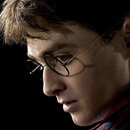Why Hogwarts Was All in Harry's Head: A Conspiracy Theory

"It was all in his head" is one of the most cliched and disappointing endings a movie or series can possibly have. So it borders on surprising that J.K. Rowling never leaned on this tired twist in her beloved Harry Potter series. Or did she? Our evidence points to yes. Here's why ...
He Was an Abused Child
Harry Potter is described as being small and skinny on account of being deprived of food. He also lives in a tiny cupboard underneath the stairs. To get any closer to the textbook definition of child abuse, you'd have to start punching kids yourself.

Harry is checked on by secret owl social workers.
Also, Harry's aunt and uncle literally refuse to acknowledge him as a human being for most of his childhood. That's emotional neglect, which is good enough for jail time in most states. Even if 99 percent of what they say is stupid, you still can't just pretend your kids don't exist without the authorities intervening at some point.
It's Called Fantasy Coping Theory
Just when the abuse and neglect are getting to be too much, Harry Potter is saved by a giant man on a magical flying motorcycle. This man takes Harry away to a place where he is wealthy, has tons of friends and can make snakes burst forth from the anus of any soul who dares to cross him. Oh, he's also the best Quidditch player ever and a magician the likes of which are only seen performing levitation tricks on the streets of Las Vegas.
A lucky break for a kid who needed one desperately? Perhaps, but the more likely explanation for this turn of events is that Harry Potter is coping with his abusive home life by escaping into a fantasy world. It's been documented that victims of abuse can escape into an alternate reality of sorts for years at a time when trying to deal with an abusive situation.

Just ... don't think about what the wand represents.
We accept that this is the far more depressing of the two options, but does it really make less sense than a homeless wizard on a flying motorcycle? Also ...
The Abuse Doesn't Stop
Now this is where things get weird. Throughout the series, Harry is sent to the school hospital no less than six times. Not only does that far outpace any reported ER visits by his classmates, but his injuries stand out as well. While classmates visit for things like having their "skin complexion altered to resemble cornflakes," Harry tends to get injured in more pedestrian ways, like a cracked skull or broken arm. Even more interestingly, there is almost always a bizarre, long-winded explanation for how these injuries happened.
Sadly, that's just another clear sign of using fantasy to cope with abuse. For starters, broken bones and head injuries are among the most common injuries children will sustain when suffering from prolonged child abuse. To combat the pain, victims will often concoct elaborate stories to explain their injuries. You know, like saying you were injured because an elf cursed a magical steel baseball and made it smash you in the arm.
Over time, these stories will change and evolve, often revealing inconsistencies that might not make sense to the person on the outside listening in. And that's why ...
All of Those Inconsistencies Make Sense Now
By far, one of the biggest criticisms of the Harry Potter series was the amount of stuff Rowling seemingly pulled out of her ass to explain the myriad details that made no sense. But if you buy into the theory that it's all in Harry's head, there's a perfectly simple explanation for that. As Harry got more mature, his own fucked-up mind tried to explain away all of the unbelievable things his younger self came up with to avoid shattering the fantasy he'd created.

Plot holes aren't the real issue here.
So, is the Harry Potter universe a massively flawed world where nothing makes sense because of shitty writing or a carefully woven tapestry of lies that eventually unravels as Harry slowly starves to death in his abusive uncle's cupboard?
We're not sure we want to know the answer.
Karl would like to thank his dad for helping with the research for this article. He's a social worker specialised in working with children with disabilities. He's rarely thanked for this, so Karl wanted to do so here. Thanks Dad!